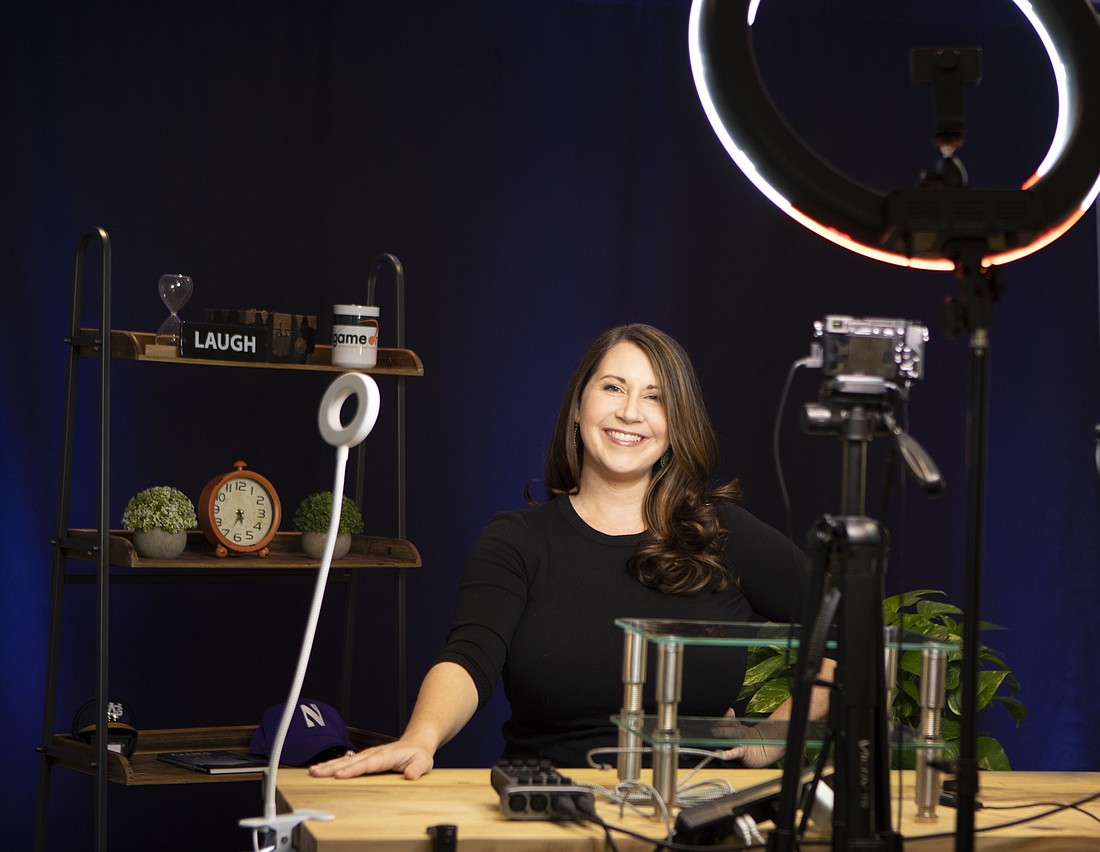- April 1, 2025
-
-
Loading

Loading

Steve Shenbaum and Blair Bloomston were having coffee in the kitchen of the Game On Nation office last summer when Shenbaum blurted out a substantial suggestion: The founder of the leadership, communication and teamwork consulting firm, Shenbaum asked Bloomston, “hey, you want to be CEO?”
Bloomston had been working side-by-side with Shenbaum since 2004, starting as an intern. By that day in the office kitchen, she’d worked her way up to partner and senior vice president. While not there from day one, in 1997, she’d been involved in nearly every big vision-based decision at the company. “Yes,” Bloomston responded simply to the want-to-be CEO query. “That sounds good.”
Bloomston, 41, took over as CEO of Game On in September 2021. Nearly a year later, it’s clear job title isn’t the only thing Bloomston plans to change. While the core of what Bradenton-based Game On does will remain the same, one of her big goals as CEO of the 12-employee firm is to offer its services to smaller and mid-size businesses.
That core is an innovative training technique and curriculum based on something Bloomston and Shenbaum created called the MILE process: Mystery, Incentive, Laughter and Empowerment. The firm’s trainers and leadership development gurus guide clients on how to “harnesses the power of MILE to create immediate improvement that businesses can see, feel and measure,” according to its website.
Shenbaum and Bloomston, both with an acting background — Shenbaum has more than a dozen credits to his name, mostly 1990s and early 2000s movies and TV shows — built a star-studded client list. Together and individually they’ve worked with pro athletes from every major sport, including No. 1 draft pick; the U.S. House of Representatives; all branches of the military; Nascar; NASA; and many more. Giant corporations Game On has trained include Deloitte and Hilton.
Bloomston says she’s aiming to bring the Game On curriculum to both smaller entities and organizations in and around the Bradenton-Sarasota area. “If you’re Deloitte, this could really work, if you’re Lloyds of London, if you’re Hilton this could really work,” Bloomston says. “But small businesses want to be able to build communication skills. They want to be able to learn these skills, too.”
Internal budgets for those two segments of clients are vastly different, Bloomston recognizes. That’s why finding new ways of delivering the Game On curriculum is one of her main change objectives as CEO. One way she will do that is through streamlining the curriculum to play to Game On’s strengths, prioritizing teamwork and communication for clients. Going direct-to-consumer also requires a mindset shift and different marketing and messaging. “I’m excited to simplify our focus and then scale the hell out of it,” Bloomston says.
Another aspect of change Bloomston puts a lot of time into is getting prospective, and sometimes even current, clients to be willing to change. That goes from approaches to project management to shifts in a business model to understanding and embracing diversity in the workplace.
That, Bloomston says, often comes down to communication — or lack thereof. “When companies fail to do well with change it’s because they don’t communicate it well,” Bloomston says, further lamenting how the work from home era has made face-to-face communication that much more challenging. “It’s amazing how radical an idea communicating with others has become.”
Game On specifically addresses change through the mystery side of MILE — making change an engaging part of work, not a drag. “When we incorporate play, like hide and seek, the unknown actually becomes attractive and magnetic,” she says. “When companies don’t communicate well, that’s when the unknown goes bad.”
A Bradenton native who moved to New York City for six years to attend college and chase an acting and dancing career, linking up with Game On was Bloomston’s real dream come true. “I was really lucky to get connected to this kind of unicorn: actors working with athletes,” Bloomston says. “Everyone can learn through these techniques. It doesn’t matter what your job title or role is.”
The daughter of entrepreneurial parents, who ran an aesthetic dental business, Bloomston eyes other changes on the Game On horizon. A big one? A return to more live events and conferences. She’s also watchful of the economy, remembering in the last downturn, in 2008-2009, “people-centric programs were the first line item to be cut” from organization’s budgets.
In the last year or so, with the Great Resignation and other workplace culture trends looming, Bloomston says companies have opened up budgets for leadership development programs. “It boomeranged back in a rapid way” after the pandemic she says, and now she, Shenbaum and the Game On team are watchful for trends in that area in the near future.
Shenbaum remains with Game On as president, overseeing culture, team development and vision for the curriculum.
Bloomston, as her one-year anniversary of being named CEO approached, said she was growing more comfortable in the position, which includes steering the business strategy, operations and partnerships/growth. “Business strategy is one of my passions,” she says. “I’m enjoying the CEO role.”